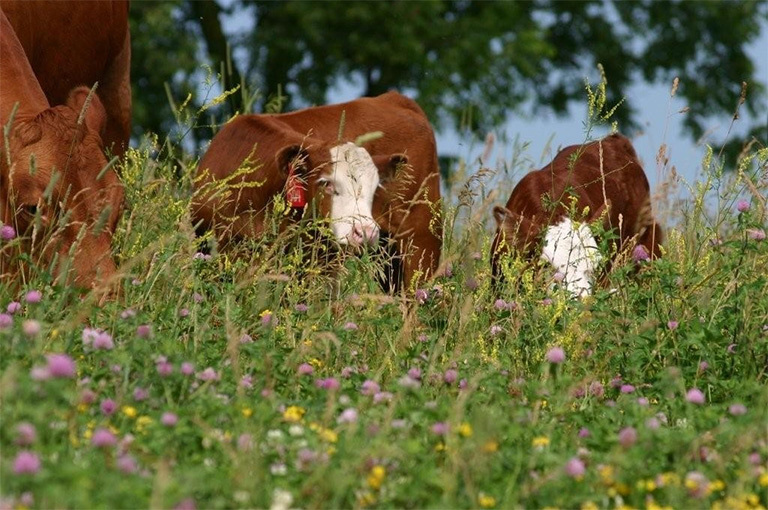Farmers have nothing to fear from green and animal welfare reforms
4/5/2024

By Debbie Tripley, Global Director of Campaigns & Policy, Compassion in World Farming
This article first appeared in Euronews in March 2024.
We currently face a triple planetary crisis of climate change, pollution, and biodiversity loss. To solve these crises and secure a healthy future for people, nature, animals and our planet, global agricultural reforms are both essential and inevitable.
The way we produce food will shape our very existence on this planet. What’s needed is a sustainable and resilient food system – of the kind set out in the EU’s Farm to Fork Strategy - that delivers healthy food in a way that supports decent farmer livelihoods and thriving rural communities. It must also lower emissions, protect the environment and biodiversity, as well as animal welfare. Business as usual is simply not an option because our current trajectory is heading towards extinction.
One thing is for certain - our current food system is not working for farmers. It’s no surprise they have taken to the streets across Europe to protest. Farmers are trapped in an unfair system that has failed them, the public, animals, nature and our planet. They struggle to make a living due to low profit margins, competition from larger industrial farms, rising energy costs, and more extreme weather which, ironically, is being made worse by intensive farming practices.
Meanwhile, this same system sees billions of farmed animals confined in intensive systems which are immensely cruel and killing our planet. Those reaping the real profits from the current food system, are the wider food sector, including retailers, as well as a handful of ‘big ag’ multinationals who have announced record profits in recent years.
Significant changes are inevitable and we will all have a role to play in this transformation towards a more nature-positive food system. Most small-scale farmers have nothing to fear from green or animal welfare reforms. It’s the big industrial farms that are responsible for most of the damaging environmental and animal welfare impacts. They pollute our air and waterways, increase the risk of diseases that affect human health, gobble up land to produce feed, waste precious natural resources, and kill off wildlife through chemical use and habitat loss. Yet our current system forces the public to pay the costs of mitigating this damage rather than charging the companies responsible.
Instead of supporting this broken system, farmers and their representative bodies should align with animal welfare and environmental campaigners. Enhancing animal welfare and adopting regenerative practices will bring numerous positive benefits to farmers and supply chain workers alike, contributing to their job satisfaction and economic stability. Together, we can bring changes that create better and more sustainable livelihoods for farmers as well as creating a healthier future for us all.
In the case of the promised EU ban on cages, we’re backing the provision of financial support for farmers to make this transition through the redirection of subsidies. Public funds should be made available to help with the capital costs of moving to non-cage systems and banks should be encouraged to provide favourable finance to farmers who are moving to high welfare systems. Farmers adopting high environmental and animal welfare standards should also be given tax breaks to properly incentivise changes that benefit society as a whole.
We must urgently explore how to restructure both our public and economic systems so that we can provide farmers with a good livelihood, more balanced and healthy diets for all, and a re-sized livestock sector, which is currently disproportionately large.
Market incentives are needed to ensure public and private investment and governments shift subsidies towards more diverse protein systems. Instead of spending public funds on damaging systems, financial mechanisms like the Common Agricultural Policy (CAP) must be reformed so that funds can be redirected to help farmers transition fairly to sustainable, nature-positive farming practices. It makes no sense that only 20% of CAP beneficiaries receive 80% of the funds, with ‘big ag’ clearly benefitting over small-scale farmers.
Creating a level playing field is also vital. Along with adopting high EU welfare and environmental standards, we must ensure that the same high standards apply equally to imported goods in ways that are consistent with World Trade Organisation (WTO) rules. Seeing farmers undercut by cheap imports produced to poor standards would be a slap in the face not only to farmers, but to EU citizens - 84% of whom want the welfare of farmed animals to be better protected.
The current threat we face is existential. Our own health, and that of animals, nature and our planet are so closely linked that they must be considered together in the solutions we adopt. The sooner we start a fair transition towards a sustainable, resilient and inclusive food system that fully respects the welfare of all three, the better it will be for farmers too.
